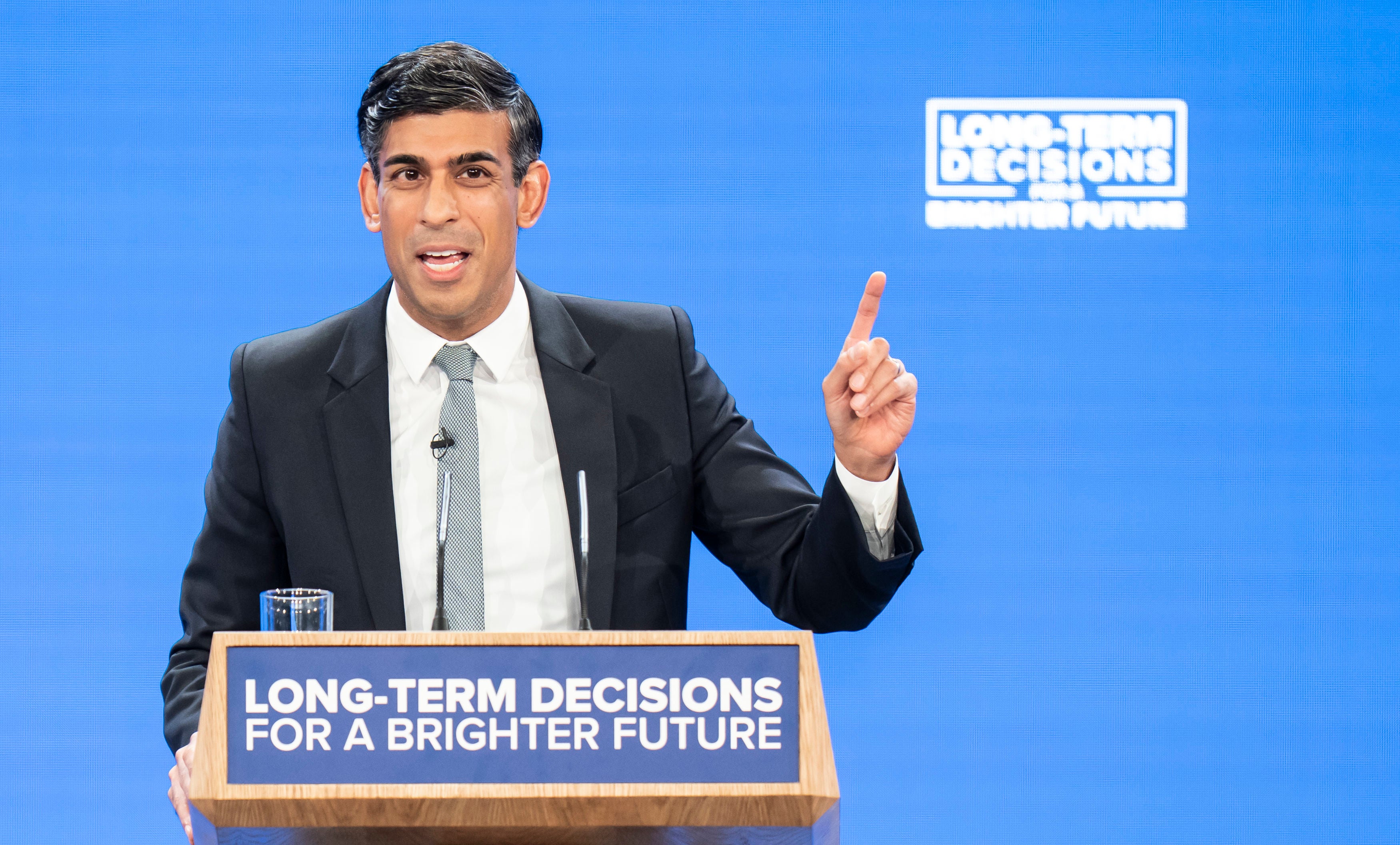Rishi’s promise to spend £36bn on small towns begs the question: Where’s THAT money coming from?
The list of schemes – road, rail, train and bus – from Sunak’s speech sounded impressive, writes John Rentoul. But untangling the cash that had been destined for HS2 will be easier said than done


Even if you agree with stopping the HS2 project and spending the money on smaller transport schemes in the North instead, Rishi Sunak is not necessarily going to get your vote.
The prime minister claims to have saved £36bn and suddenly has a magic money tree of spending available at a time when the public finances are squeezed. But it is all capital investment, so the “savings” can be spent only on infrastructure projects.
The list of schemes – road, rail, train and bus – that he read out in his speech to cries of “more!”, sounded impressive. “There is more; there’s lots more,” Sunak said. But having just cancelled one big, long-term project, why would the voters think that he will see hundreds of slightly less long-term ones through?
Promising to use those funds to resurface some A-roads sounds like maintenance to me – rather than capital investment. But new roads and railways will take several years to produce results. Not as long as HS2, which wasn’t expected to reach Manchester until the 2040s anyway, but certainly after the election.
The only other thing in Sunak’s list – and again it is not a capital item, so it should not have been in there – was his promise to “keep the £2 bus fare across the whole country”. That is something that matters to a lot of people, many of them poor, but it is not much of a return on cancelling a multi-billion-pound bullet train.
When Sunak said: “Every region outside London will receive the same or more with quicker results,” that was a promise for which, as an exercise in teaching maths to age 18, we would like to see his working. It seems to depend on saving £6.5bn on building the Euston end of HS2, simply by taking it away from HS2 Limited and giving it to a different contractor, and reallocating the money to the North. I think it is the right idea, but that is no guarantee that it will happen.
That part of Sunak’s speech was like an A-level economics class. He explained the sunk cost fallacy: “There is nothing ambitious about pouring more and more money into the wrong project.” And he set out the concept of opportunity cost: “You can’t have both.” That is, you can either invest in HS2 phase two or in a lot of smaller projects, but one pound spent on one cannot be spent on the other.
All terribly sensible, and I would trust Sunak as the technocrat to sort out the unrealistic assumptions that his Conservative predecessors tolerated for the sake of a shiny “modern” prestige project. Whatever Keir Starmer’s strengths – and they have been underestimated – I don’t think he knows one end of a cost-benefit analysis from another.
But I don’t think most voters are likely to make the same judgement. If Sunak tells them that HS2 is a waste of money and that the savings should be diverted under new management to better plans, they would be inclined to agree and to vote accordingly. For many people, the subtext of that section of Sunak’s speech was: “Scrap it and put Labour in charge.”
Which was why the “change” message of the rest of Sunak’s speech was so strange. He attacked “30 years of a political system that incentivises short-term decision making”, a period that lumps together 13 years of New Labour and 13 years of Conservative government, and proclaimed the end of an error.
People don’t really want change; they want a government that works. Boris Johnson was a change, but they voted for him mainly because he promised to get Brexit done. Sunak made a half-hearted attempt to revive that sentiment when he suggested that Labour would re-open the Brexit question: “While we’re thinking about the future of Britain, Keir Starmer is just banging on about Europe.” It was a clever line, but it missed its mark because most people don’t think Labour are desperate to rejoin the EU.
So while Sunak promised change, he delivered a section of the speech on education, which he described as the “silver bullet”, that could have been delivered by Tony Blair – apart from the attack on Blair for allowing too many people to go to university. And the main policy on education that Sunak announced in the speech was a tax-free bonus for new teachers that would not be paid until after the current public spending planning period.
Even the bit about the family sounded Blairite. Sunak said: “Whenever you talk about family, someone whispers, ‘Is that wise, prime minister?’” I remember Blair saying almost the same thing when he wanted to talk about strong families.
Yet some teenage “strategist” has taken a cliche of American political consultancy – it was James Carville who described Bill Clinton’s 1992 presidential campaign as “change vs more of the same” – and tried to shoehorn Sunak’s speech into the “change” part of that choice.
It won’t work. “Competence vs turmoil” might work. Or “technocrat vs shapeshifter”. But not “change vs more of the same”.
Sunak ended his speech declaring: “It is time for a change and we are it.” The danger for him is that the voters hear the first part, “it is time for change” and complete that sentence in their heads: “It is time to let the other lot have a go.”







Join our commenting forum
Join thought-provoking conversations, follow other Independent readers and see their replies
Comments